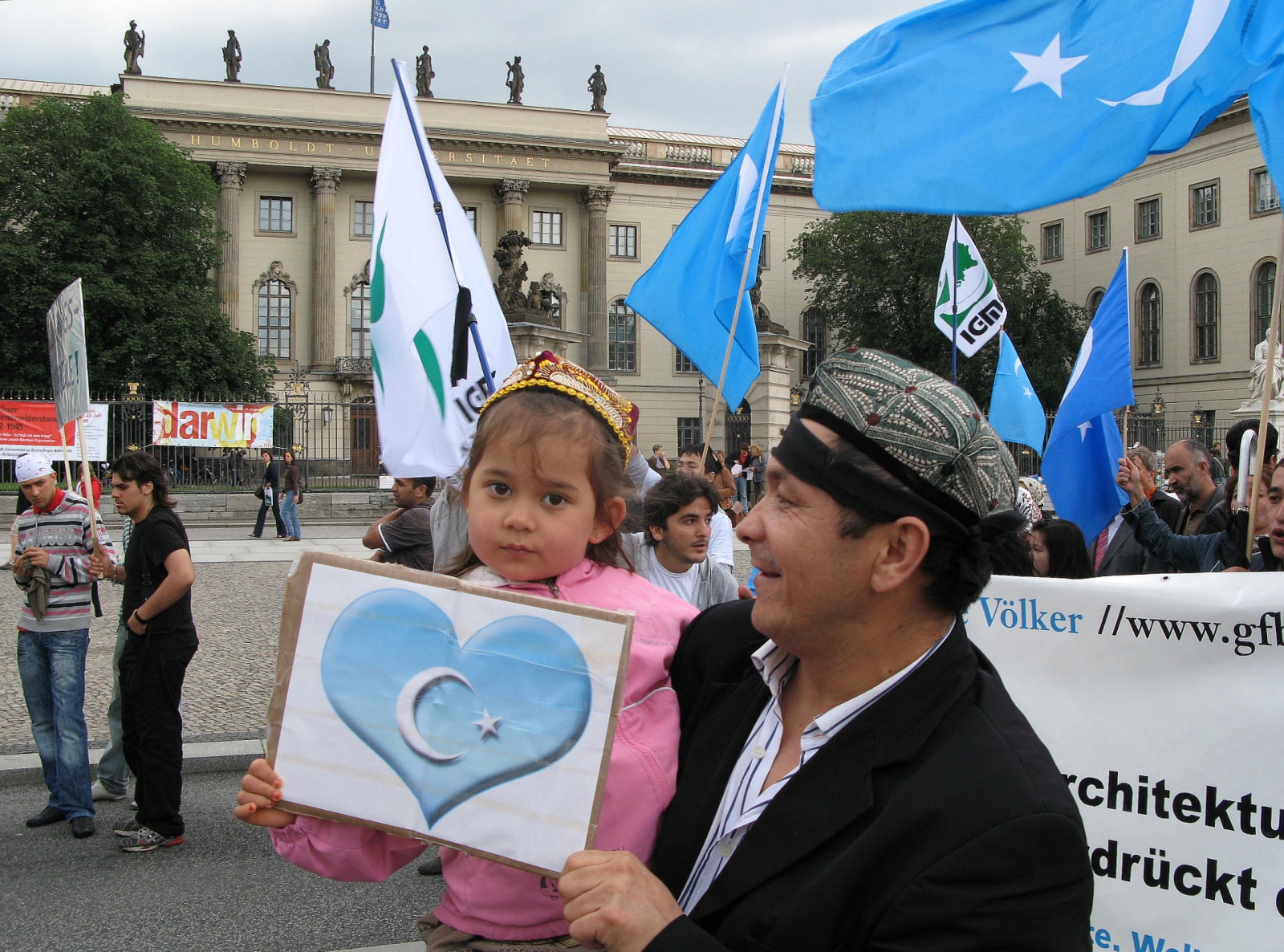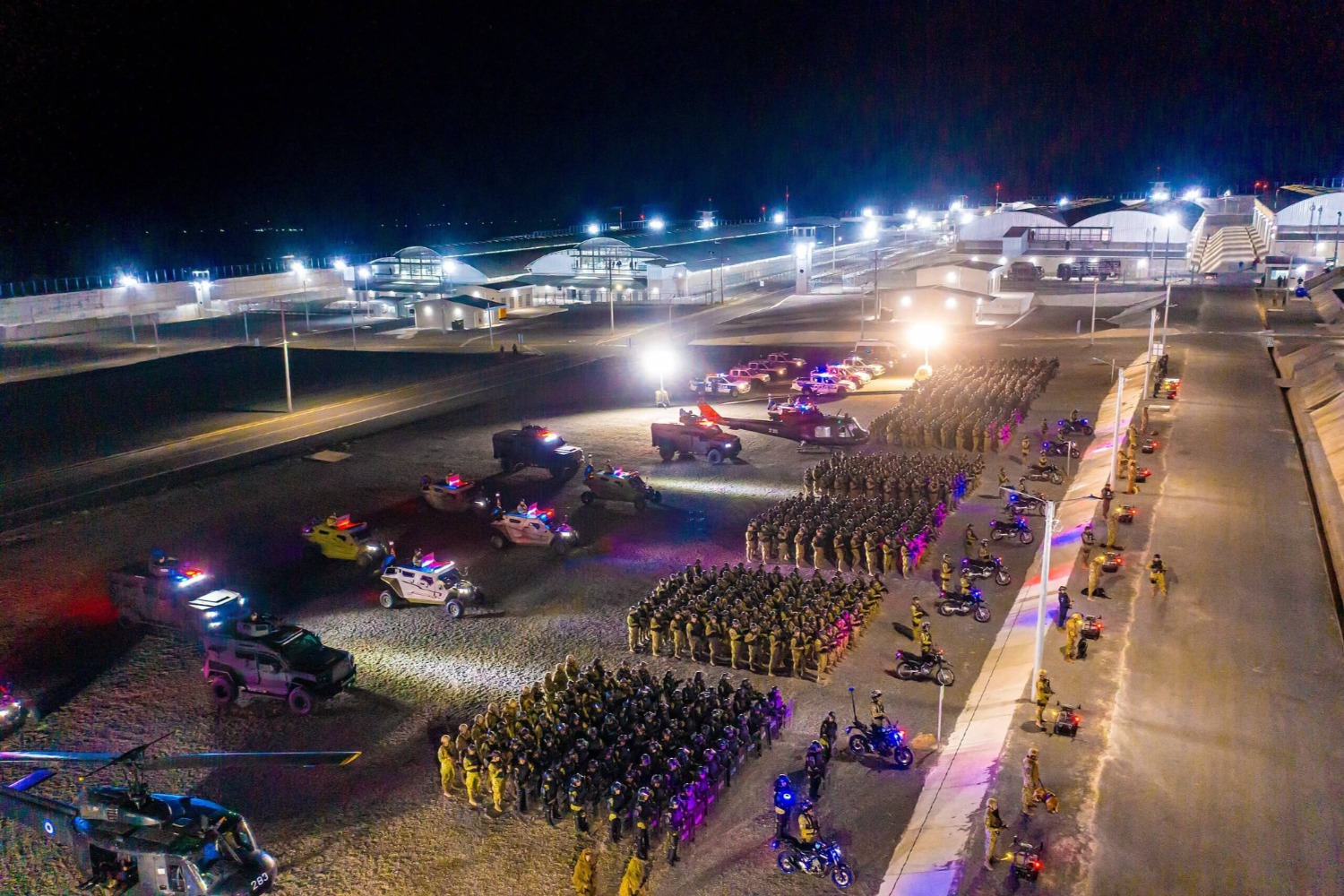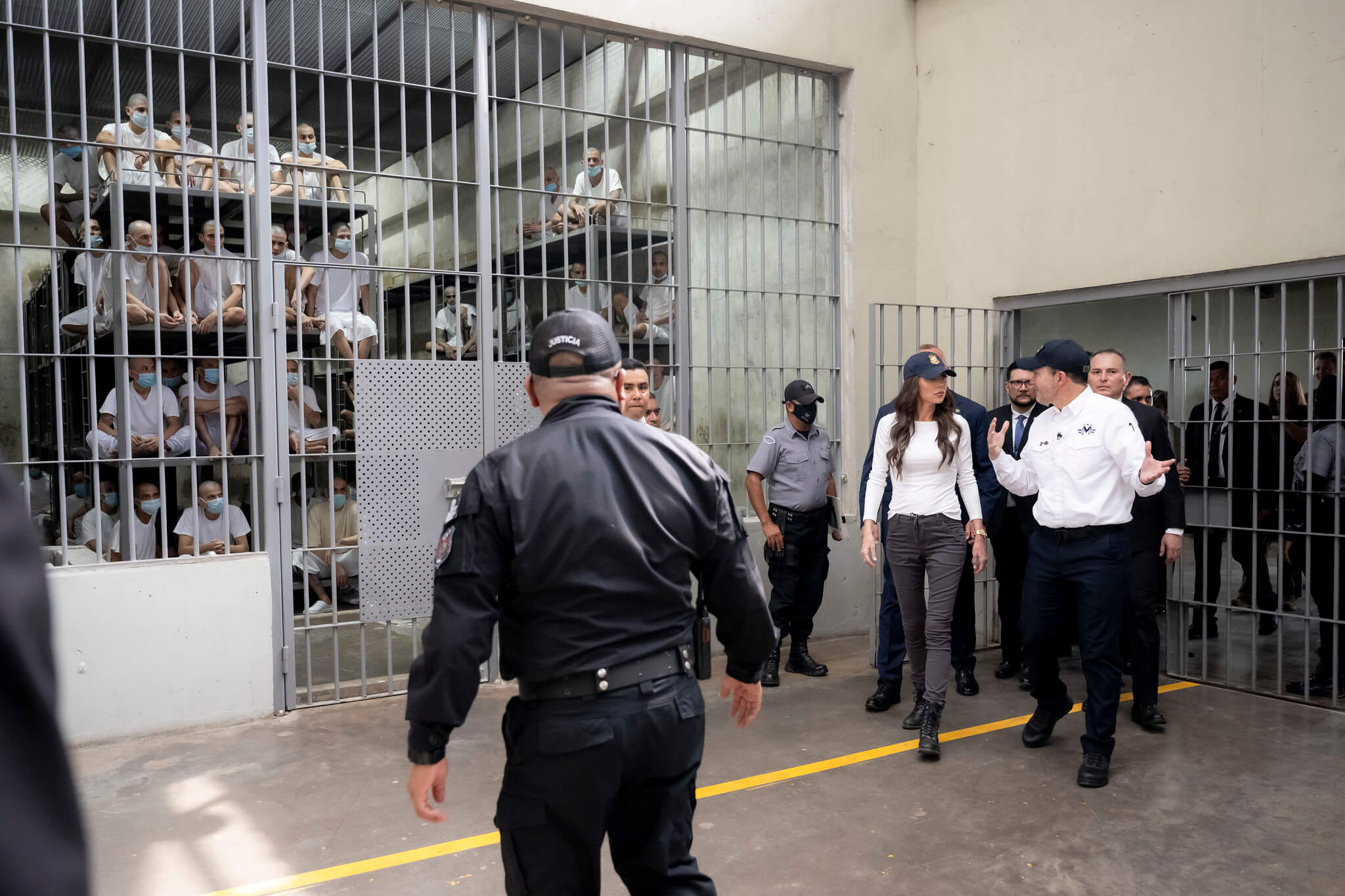Unpacking the Recent Uighur ICC Complaint Against Chinese Leaders
Uighur activist groups filed an ICC complaint against Chinese officials. What’s in the complaint, and how could the ICC exercise its jurisdiction considering China isn’t signed to the Rome Statute?

Published by The Lawfare Institute
in Cooperation With

On July 6, 2020, two Uighur activist groups, the East Turkistan Government in Exile and the East Turkistan National Awakening Movement, submitted a complaint to the Office of the Prosecutor (OTP) at the International Criminal Court (ICC) against Chinese leadership. The complaint alleged that the officials engaged in genocide and crimes against humanity against the Uighur minority population in Xinjiang.
The history of conflict between China and the Uighur population dates back centuries. But since 2018, reports of detention camps and mass violations of fundamental rights in the Xinjiang region have skyrocketed. And this complaint is the first attempt to use an international legal forum to challenge China over allegations of extensive human rights abuses against Muslim Turkic minorities in the Xinjiang region.
Background
The Uighurs, a largely Muslim Turkic ethnic group, have lived in a region in the far northwest of modern China for centuries. The region is called Xinjiang, which translates into “new frontier” in Mandarin, and was given its current name in 1884 when it was established as an official province of the Qing dynasty.
In the 20th century, Xinjiang experienced fleeting periods of independence as a civil war was waged between the Nationalists (Kuomintang) and the Communists for control over China. The region was established as the independent East Turkestan Republic briefly in 1933, and once more in 1944, but was brought under Chinese control in 1949 when Chinese Communist Party leader Mao Zedong declared the formation of the People’s Republic of China (PRC).
The Uighurs were then officially designated as the ethnic minority in Xinjiang and the area was established as an autonomous region in China. At the time, Uighurs constituted 75% of the population in Xinjiang. But the ethnic population had no significant political power, which enabled Beijing to continue exercising control over Xinjiang as it saw necessary. This laid the groundwork for the years of struggle between the Uighur population and the central government that ensued.
The following decades were marked by increasing political activism for the liberation of East Turkestan alongside expanding campaigns of repression by the Chinese government. Under the more liberal and reformist leadership of Deng Xiaoping, which began in 1978, Uighurs experienced a short period of religious and cultural freedom not seen since the formation of the PRC.
Subsequently, by the early 1990s, Xinjiang experienced a resurgence of Uighur traditions and religion. This unnerved Beijing and resulted in a Party crackdown on civil unrest and separatist groups in the region, with both the government and Xinjiang civilians committing acts of violence. The Chinese government further tightened its grip on the Xinjiang province in 2001 in a series of executions which it claimed were meant to control the Muslim minority separatist threat.
On July 5, 2009, tensions came to a head during the Urumqi riots, which marked the most deadly unrest in China in decades. The riots were followed by a series of violent acts, including a 2014 knife attack in a crowded train station in Kunming, China, in which 31 people were killed and 141 were wounded. Beijing condemned the massacre as an act of terrorism and three of its perpetrators, who each had ethnic Uighur names, were executed by the Chinese Communist Party (CCP) in 2015.
Weeks after the stabbing in Kunming, President Xi Jinping visited Xinjiang and began delivering remarks privately to officials, calling for “absolutely no mercy” against “terrorism, infiltration and separatism.” The Chinese government then began a crackdown of unprecedented proportions, launching a policy called the “Strike Hard Campaign against Violent Terrorism.” This policy established a dense surveillance network of ethnic minorities in Xinjiang, which the Party called “grid-style social management,” and incorporated “counter-extremism” efforts such as re-education camps to forcibly indoctrinate the local population. The CCP began these repressive efforts to achieve what one Chinese official called the goal of “standardizing of human behaviour.”
The July 6 complaint, filed on the 11th anniversary of the Urumqi massacre, predominantly compiles evidence detailing the alleged role of senior Chinese leadership in the crimes committed against Uighurs, Kazakhs, Kyrgyz and other Turkic groups since 2009--all of whom are predominantly Muslim. In 2010, Uighurs made up about 46% of the population in Xinjiang, Kazakhs accounted for 6.5%, and other ethnic minorities constituted about 7%, with the rest of the Xinjiang population (roughly 40%) identified as Han Chinese, the majority ethnic group in the PRC.
The complaint comes amid growing international backlash as media outlets have begun to cover in greater depth Beijing’s alleged systematic persecution of ethnic and religious minorities in the Xinjiang region. For its part, the U.S. has accused Chinese leadership of serious human rights abuses against the Uighur population, and on July 9, imposed sanctions targeting four Party officials for their role in the alleged atrocities.
Legal Basis of the Complaint
Why has it taken so long for allegations of human rights abuses in Xinjiang to make it to the ICC, an entity whose very mandate is to end impunity for the perpetrators of mass atrocities and crimes against humanity?
The answer largely has to do with Article 12(2)(a) of the Rome Statute (the Statute), the Court’s founding treaty, which establishes preconditions to the exercise of the Court’s jurisdiction:
In the case of article 13, paragraph (a) or (c), the Court may exercise its jurisdiction if one or more of the following States are Parties to this Statute or have accepted the jurisdiction of the Court in accordance with paragraph 3:
(a) The State on the territory of which the conduct in question occurred or, if the crime was committed on board a vessel or aircraft, the State of registration of that vessel or aircraft
China is not a party to the ICC, and therefore is not subject to the Court’s jurisdiction per the Rome Statute.
However, ICC decisions in 2018 and 2019 from Pre-Trial Chambers I and III, respectively, clarified that the Court may exercise jurisdiction over international crimes when part of the criminal conduct takes place on the territory of a signatory. In 2018, the prosecutor of the ICC, Fatou Bensouda, submitted a request to exercise jurisdiction over the alleged deportation of the Rohingya people from Myanmar to Bangladesh.
She argued that although the coercion to deport members of the Rohingya people occurred in Myanmar (which is not a party to the Statute), the action of the crossing the border technically occurred in Bangladesh (which is a party to the Statute). Because the border-crossing was an element of the forcible transfer and deportation crime, Pre-Trial Chamber I agreed with Bensouda and decided that the case would fall within ICC jurisdiction.
In 2019, the OTP found there was a reasonable basis for the allegations of crimes committed against the Rohingya people and submitted a request to Pre-Trial Chamber III in order to open an investigation. The Court granted the prosecutor’s request.
These decisions in the Rohingya case expanded the court’s jurisdiction by allowing for a cross-border extension of the continuing crimes doctrine, which grants the ICC authority over sustained offenses that occur partly within the borders of an ICC member state even if those offenses also take place within the territory of a non-member state.
The legal team behind the complaint argues that Chinese leadership has unlawfully deported Uighur victims from Tajikistan and Cambodia into Xinjiang, where they were then detained and subjected to more international crimes as part of the alleged illegal Chinese campaign against religious and ethnic minorities. The majority of international media attention on abuses in Xinjiang has not focused on these alleged deportations, but rather has centered on the abuses occurring within China.
The advocates claim that this has occurred as part of “a concerted and widespread campaign by the Chinese government to round up tens of thousands of Uyghurs abroad and those who have fled persecution, to force them back into occupied East Turkistan.” Therefore, the complaint asks for an investigation into crimes committed partially within the territory of the People’s Republic of China but also in the territory of Tajikistan and Cambodia--both parties to the Rome Statute. This circumvents the problem of China not being party to the statute.
It is not clear whether the complaint only refers to victims that were deported from Tajikistan and Cambodia, or if it encompasses all Uighur and Turkic victims of the alleged Chinese campaign.
What do we Know About the Complaint?
The 80-page complaint was filed on behalf of two Uighur representative groups, the East Turkistan Government in Exile (ETGE) and the East Turkistan National Awakening Movement (ETNAM). Though the submission itself is not public, you can read the press release here and watch the press conference here.
The submission asks the OTP to open an investigation into genocide and crimes against humanity allegedly committed against the Uighur population and other Turkic people. The filing identifies the roles played by over 30 senior Chinese officials allegedly involved in the campaign, including President Xi Jinping, public governors, current and former Chinese secretaries in the Xinjiang region and top People’s Liberation Army officials.
The complaint provides evidence drawn from witness testimony and official reports. It alleges a host of crimes including murder, torture, unlawful imprisonment and forced marriages. It calls for the investigation of atrocities including massacres, mass internment camps and enforced disappearance of persons.
More specifically, it details crimes such as forced sterilization, forcible transfer of children from their families, measures aimed at eliminating the use of Uighur and other Turkic language in schools, enhanced surveillance of Uighurs and other Turkic peoples significantly beyond that experienced by Han Chinese, organ harvesting and repressive measures against the practice of Islam.
The evidence includes “descriptions of brutal torture through electrocution, humiliation in the form of being forced to eat pork and drink alcohol, mandatory insertion of IUD birth control for Uyghur women of child-bearing age… and an estimated 500,000 Uyghur children being separated from their families and sent to ‘orphanage camps’ where there have been credible reports of attempted suicide by the children.”
What Happens Now?
Now that the complaint has been submitted to the OTP, it is subject to review by Fatou Bensouda, the current prosecutor of the ICC. On the basis of the material provided, Bensouda can decide whether to bring the evidence to judges at the Pre-Trial Chambers and request the authority to investigate the crimes allegedly committed by Chinese officials. Bensouda can add to the substance of the complaint by collecting more evidence through her own investigation, for example, by calling witnesses to testify at the Hague.
If an investigation is opened and there is sufficient corroboration for the allegations made, Bensouda can look to bring charges and prosecute the persons responsible. There is no timeline for these proceedings, and the lawyers representing the ETGE and ETNAM emphasized that the complaint is at a “very early stage in the process.”
Notably, the ICC is currently in the process of selecting a new prosecutor, as Bensouda’s nine-year term will expire in June of 2021. Depending on the time the OTP spends reviewing the complaint and gathering its own evidence, this will likely mean that any investigation opened will fall into the hands of a new prosecutor. And the Uighur case won’t be the only one affected by the change in the prosecutor’s office, which is currently investigating 13 distinct situations.
Still, the ICC largely operates at a glacial pace. Since its establishment in 2002, the ICC has issued just eight convictions. And it continues to face backlash from major global powers, namely the United States. In March of 2020, the Appeals Chamber of the ICC greenlighted an investigation into crimes allegedly committed in Afghanistan since 2003, including those attributed to the United States. The U.S. has retaliated by sanctioning several ICC officials involved in the investigation. Like China, the U.S. is a great power that is not signed to the Statute.
By opening an investigation, the prosecution would send a message that these allegations against Chinese leadership are very serious and merit a closer look. As noted by Rodney Dixon, the lead lawyer on the complaint, that message “could have the positive spinoff of deterring crimes that are going on at the moment” in the Xinjiang region. But the ICC will likely face serious backlash from China at a time when it is already under fire from the United States.
Moving forward with this complaint, the ICC will have to weigh the costs of antagonizing another global superpower with the potential of deterring Beijing’s malign behavior.





